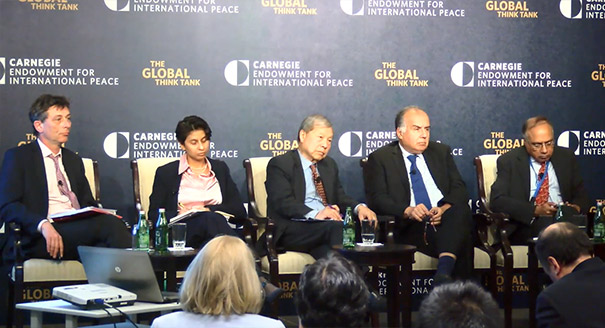Registration
You will receive an email confirming your registration.
The IMF’s new study on Low Income Developing Countries (LIDCs) says that vulnerabilities have increased steadily over the past two years. Forty percent of these countries are now deemed highly vulnerable to growth shocks, the highest level recorded since the global financial crisis. Countries heavily reliant on commodity exports (such as oil and minerals) experienced a significant slowing of growth in 2015 that is largely expected to carry over into 2016. Additionally, LIDCs will need significant external financial support for national programs to adapt to climate change over the medium term—otherwise, attaining ambitious development objectives will be very difficult.
Min Zhu, Rupa Duttagupta, and Chris Lane discussed the economic consequences of this outlook and outlined the policy options available. Uri Dadush and Amar Bhattacharya offered comments, and Carnegie’s Yukon Huang moderated.
Min Zhu
Min Zhu is deputy managing director of the IMF. He previously served as special adviser to the managing director at the IMF and deputy governor of the People’s Bank of China.
Rupa Duttagupta
Rupa Duttagupta is chief of the Low-Income Countries Strategy Unit in the IMF's Strategy, Policy, and Review Department.
Chris Lane
Chris Lane is chief of the Low-Income Countries Division in the IMF’s Strategy, Policy, and Review Department where he is responsible for fund policies and the review of programs and surveillance in 70 low-income and developing countries.
Amar Bhattacharya
Amar Bhattacharya is senior fellow at the Global Economy and Development Program at Brookings Institution. His focus areas are the global economy, development finance, global governance, and the links between climate and development.
Uri Dadush
Uri Dadush is a senior associate at the Carnegie Endowment for International Peace where his research focuses on trends in the global economy. He was previously president and CEO of the Economist Intelligence Unit and Business International, and served as the World Bank’s director of international trade and director of economic policy.
Yukon Huang
Yukon Huang is a senior associate in Carnegie’s Asia Program, where his research focuses on China’s economic development and its impact on Asia and the global economy.
